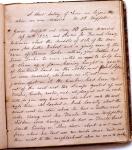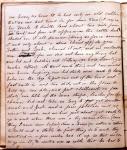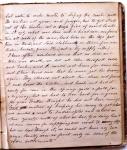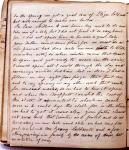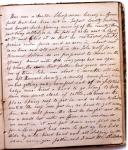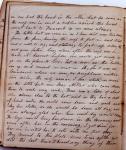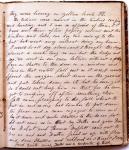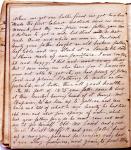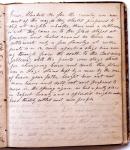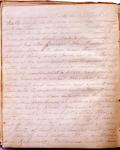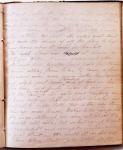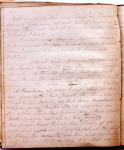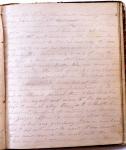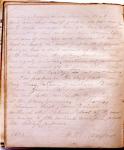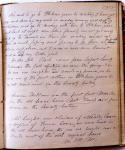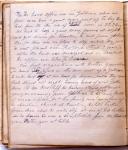Scrapbook > Text > Mary Jane's Journal > Mary Jane's migration story
Click on thumbnail for larger image
[page 30]
A short history of how we began when we were married MJB Moffett
Garner Moffett and Mary JB Davis married Sep 15th 1831. and started for Hancock County Indiania about the Middle of Oct. of the same yeare, his brothe Robert and a young man by the name of James Loehr with us, your Father had hired Loehr to come with_ us to help him to cleare up a farm, haveing bought a quarter of timbered land on the Nathional Road before we were married, No house on it, not even a garden spot on it, the timber had been cut out of the road and the stumps grubed up and trunks, limbs, roots, and all, draged out on each side, so you may have some idie what work the road made him. We landed in Rush County about the second week in Nov. where he had a brother and sister liveing and his Uncle Thomas Moffetts children were liveing, and he had an Uncle David Smith liveing on blue river about 4 or 5 mile from where his land was[.] we made some Visits and then went to the neighborhood where we were to make
[page 31]
our home, no house to be had only an old cabbin that no one had lived in for some time (it was on his Uncle D. Smiths land about two mile from our land) and from all apperances the cattle had shaded in it all summer (being no fence around it and only about a Acre cleared off.) So your Father and Loehr cleaned it out, and we unloaded our carry all, for we did not have anything but our bed and bedding and clothing. (no 3 or 4 Saretoga trunks either) No rail roads then) and commenced our house keeping, our bed steads were made by boring holes in the logs to put one end of the head and foot rails in and two sticks out in the floor to hold up one side, and put clabboards on for slats, our table of the same stripe, benches for chairs, did not take us long to get some corn meal and pork and a few potatoes and we went to work and we had just about got ready to go to work when there was a big snow storm (something I never saw before) Now a house (or rather a cabbin to build and a stable the first thing so to work they went and in a few weeks had it up so that we could go in it. The winter was so cold that he had to
[page 32]
boil water to make morter to stop up the cracks with the timbers all green and frozzen, had to get it all out of the timber not a single pice of sawed lumbe in it only what was done with a hand saw. our furniture all made of the same, bored holes in the logs put [firm?] in them, and laid clabboards on them for our dishes, buckets, pans etc. (not a big supply either)
I have often wondered since that we did not take our death, we did all take dredfull colds and Loehr, and I could not heare for some time and I have heard since that he never got his hearing again. They cleared out about ten Acres and fenced it and burnt the timber and brush and had it ready for corn in the spring. quite a field for a beginning, but we had to live hard for a yeare for your Father thought he did not have enough land so instead of keeping his money to get what we needed _ went to Indianopilas and entered one other quarter north of what we had, by so doing limited our means for supplying our wants (a wrong step but we lived through it, we could not have any luxurys, Country new no fruit only in some of the older settlements
[page 33]
In the spring we got a good cow of Eliza Coldwell [?] had milk enough to make our butter
In June William D was born. My work to do and take care of a baby, but I did not find it so vary hard for I did not spoile him so he was a good baby. Your Father raised some flax (for we must do as our parents had done make our own cloth to clothe ourselves with) so when winter came that must be spun and got ready to weave in the spring. I would spin all I could through the day and evenings untill bedtime but in dec. I had a fellon on my right __ finger that put an end to my spinning or any other work that winter for several weeks, so we had to hire it spun and when Mr. Moffett counted the cost of the cloth it amounted to about as much more as he could bye the cloth for in the store[.] We had to get it wove also, your fathe cleared out more land that winter and fenced and so we lived along in our back wood stile we had some few good neihbers Mr Ge_mey Caldwell and a few others, one virginia family by the name of Davis, but no relation of ours,
[page 34]
There was a Docter Chapman liveing in Greenfield that had been out in Laport County Indiana and brought back glowing news of the country (there just being settled) so in the fall of 33 he went to look at it and liked it so that he contracted for 80 Acres praira under fence and 40 acres in wheat and came home and sold out to a Mr. John Wolf [?] for a thousand dollars so we prepared to move in the spring[.] Moved with waggens, had one span of horses, the mare that father had given me was one of them, John was about 5 months old when we left Hancock County, a muddy swamping time we had getting out, camped out of nights, two babys now. hired a hand to go along to help drive our small stock of cattle. No house on the place spring crop to put in and no time to build untill the crop was put in, no house [?] to get nearer than two mile from the land he bought and that one a small hut with no floor nor window. so we went in it and put down some flat rails for a floor just had room to put up two beds side by side hired hand and all sleeping in the same room. your father and I and the children
[page 35]
in one bed the hand in the othe but so soon as the crop was in and a cabbin raised the hand went back to Hancock so we were alone.
The little hut we were in as I have said was two mile from the farm, haveing the crop to put in and tend and a well to dig, and stabeling to put up also, and your father being alone, after the crop was in, made it harvest before we could get ready to go on the place to live. but so soon as the cabbin was up and covered we went in it, for I was so loansome where we were, no neighbours within two mile, the only woman I saw while we were in the little hut was Mrs. Willet who came down there to wash every week. There was a lake of about ten Acres close to the hut and as they had a well of hard water she would come down and wash and dry her cloths, so she would be down all day, and i was always glad when her wash day would come. The boys would bring her down in the Morning and come after her in the eavening, i got diner for her an invited her to eate with me that day. They moved to this state some time after we did the last time I heard any thing of them
[page 36]
they were liveing on yellow Creek, Il.
The Indians were around in the timber,s camping and hunting and I was so affraid of them. I have seen them often passing around next the timber and lake, one day two rode up to the hut but went away without doing any harm.
I would be all day alone, and I thought the days almost a week long no one but the babys and me. we went in our own cabbin with out a floor or shutter to the door or a window and lived in that untill fall just as it was, I would spread the waggen sheet down on the ground and put John down on it but he soon got so I could not keep him on that for he soon got to creeping off after something else. fall came, ploughing to do, fall wheat to put in and so on, had lumber to put down the floor and a man engaged to come and lay it down and make shutters to the doors, but did not come so in Oct. my Fathe and your Uncles Robert and Thomas Moffett came out to see us and and Father fixed us up with floor and door shutters and cubbord so I thought i was fixed quite nice. Fathe was a carpenter by trade.
[page 37]
When we got our Cabbin fixed we got two bedsteads the first cabinet bed steads since we were married, and they were plain ones[.] father gave me 5 dollars to get a wide bed stead so that made three and while we were in Hancock County your father bought an old broken falling leaf table and my clock at a Constable sale 4 chairs made up our furniture. I was contented and happy, I did not want every thing that I saw every one else have for I knew we were not able to get it, we had plenty of plain food and plain clothing to make us Comfortable, and better than all good health.
In the fall of 1835 your fathe came to look at this Country [Carroll Co., IL] haveing heard of it through Doct Chapman, he had been up to Gallena and came back and told of what a nice Country he had traveled over and what fine springs of water, which took your fathers fancy, so he must come out and see it for himself. Old Mr. Laird and your Uncle Robert Moffett and your father fixed up a waggon, prepared for camping out, had a gun along provisions, and grain, to feed there
[page 38]
horses, blankets etc for the country was new most of the way, so they started prepared to stop at night wheather there was a settlement or not. They came on to this place stoped at Garners and looked around no towns nor settlements only a few familys at certain points 10 or 12 mile apart a stage line runing through from the south to the Lead mines (Gallena)[.] All the points were stage stands for changeing horses and meals[.] this place was a stage stand kept by a man by the name of Crain[.] your fathe bought him out and came home and sold out and prepared to move in the spring again. we had a pretty place in Laport County and a splendid neighourhood thickly settled and nice people[.]
[Note: the remaining narrative was recorded in a different ink which has faded]
I regretted verry much to leave there so in the spring of 1836 we started for Ill. We sent on one ox teame with our heavy goods and one bed and bedding with two hands that your father hired to work for him that summe. They came on in Feb. while the ground was frozen (in March) left bachelrs hall. made rails
[page 39]
There names were Hulls and Eliott. Hulls has been to see us and since married and was liveing not fare from Freeport when I last heard of him. Eliott went to Iowa so I have heard. Only a few familys around here Mr. Garners, Mr. Owens, Cranes, Swagrets none nearer than west plumb river, west lands had not been surveyed by goverment untill several years after we came here, persons coming to the country would select a place and run a line around a certain boundary and claime it, and improve, and agreed among themselves to respect one and others claim and no one else dare intrude on the claimants, some fine houses at Savanah, Gallena was our trading place sometimes we traded at Savanah, Bower kept a store there. after some yeares Samuel Flytes came out to this Country and bought up several tracts of land, and brought out several family and settled them on them. And Rinewalt, Halderman, Emmert came
[page 40]
out and built the Carroll Mills and set up a store. Old Mr. Ervin came on after we and bought the store out and kept it for some time, After that the country has settled up fast[.] We worked and saved and made the money of off the place to buye oure farme when it came in markett.
The land office was at Dixon[.] Mr. Wolf your Father, Owens, Garner and others all went down together and paid for there farms adding from time to time a few hundred acres more, your Father has owned and sold a great many hundred acres of land in his lifetime and finaly before he died gave all the land he owned to the raile road company[.] Now I have nothing Left of what I worked and helped to make left. That is the way things turn up sometimes. Riches take wings and fly away. Although we were not what the wourld call rich, but we had enough to make us comfortabl and enough to give our children a good start in the world if we had not have taken that false step. MJBM
[page 41]
William and John were borne in Hancock County Indiania 20 mile East of Indianapolas two or three mile East of Greenfield on the National Road.
Robert was borne in Laport County Indiania on Rowling praira about 8 mile from Laport town, 20 mile from Lake Michigan.
Sarah and Margarett were born in Carrol County Ill now (then Joe Davis County) on the old place that we first came to in the same old double cabbin down in the bottom north of the timbe
No Preaching of any kind when we came here your Fathe had joined the Christian Church in Laport, we had some members in Elkhorn grove (Brothe Clarks) and what was then called Chambers grove (now Brookfield) Brothe Yeager and one or two other familys Bro. Yeager heard throug Bros Clarks of your father and one Sunday about the first of June he came to see us and made him self known our had a long talk (that was in
[page 42]
[faded ink]
June 1837) They then made arrangements to have preaching at deferent points that summer organized a church at Elkhorn grove Genesee and here but not here untill the next summer after we came home from our visit to VA (we were away the summer 1839) 1840 we commenced meeting to break the bread only 5 or 6 of us there we began to have some additions from time to time Sister wolf and Brothe John was among the the first. In the fall of 1838 I was Immerssed by Garner Moffett in the creek neare where George Hick lives had not had but a few sermons in the neighbourhood by bro Y and no church formed then I had been reading for myself and come to the conclusion that I would obey them so I talked to him about it, he spoke of waiting and haveing Bro Yeager appoint a meeting at our house (when we had any preaching it was in our house) but I did not want to wait (it was Sunday, so we went down to the creek with the children I had some private reasons for not haveing
[page 43]
meeting (Margaret was borne in Dec.) for I new what kind of people we had around us to make remarkes[.] now, you have a short account of how we began our married life and some of our ups and downs, but we lived as hapily as most people do I supose
And you have a short account of the begining of the church in the place, sometimes we had a goodly number, sometimes not so many member some went off to Adventism some moved to other localitys some cast out and so on. Our preachers in the days past were Henry Howe, Professer Pederson [?] Yearshaw [?], C_rrell Yeager[,] Garner Moffett[.] The two latter made the begining of the place, Genesee, Elkhorn, Johnsens Creek (now Thomson) no church at Elkhorn took up by moveing away to othe sections some few joined other boddys of ______[profesers or purposes?]
1876
MJB Moffett
[page 44]
1878
We used to go to Elkhorn grove to meeting I have got up and done my work on Sunday morning and dressed my children and go to meeting with him to Elkhorn grove and back at night now Johns family can not get ready and go to Lanark in time for meeting we did not have so much fussing and fixing to do then we dressed plain and clean, and I wore a nice sun bonnet and so did my little girls
Brothe John Clark came from Laport County Indiania the fall of 35 we came the spring 36 he was our neighbor on rowling praria, so he was one of the first settlers in Elkhorn grove he is not mentioned in the County history
Simon Fellows was the first Post Master in the old Crane house (not Haris [?] as is put down in the County history.
We bought our claime of Wesley Crain a nephew of Thomas Crain, we neve lived in the old Crane house, the one we bought was a mile west of the old original house
MJBM
[page 45]
__ [?] The Land Office was in Gallena when we first came here a great many went up to buy there land from the other side of Rock river in 37. __ [?], we had to keep a great many persons all night and get dinne for traveller to and from Gallen[a] then, for there was no place to stop untill they got to west plumb river (Kellogs stand 9 mile). After the lands was surveyed and in Market the office was taken to Dixon
Our first acquantance with Brother [Y?]earnshaw was in March 1837. he and an othe man went up to Gallena to enter land stoped at our house for dinner, and as they came back stayed all night, haveing heard of your fathe from old Mr Radcliff he haveing stayed stayed all night going or comeing from Gallena to buye land, Radcliff was an infidel, but his family were members of the Christian church at Prinston, he told brother _ [Y?]earnshaw where he could stop at one of his brother for he knew he was a Campbellite from the thanks your Father gave at table
